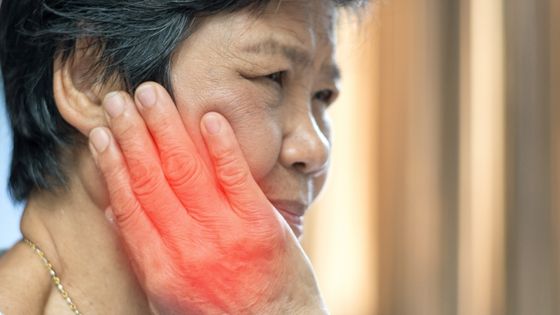TMJ is a common disorder with a variety of symptoms. These symptoms of TMJ disorder include limited jaw movement, earaches, and toothache. Some people also experience trigger points, which are muscles that contract in the jaw and refer pain to other areas. Symptoms of TMJ pain can range from mild to severe and may be associated with other conditions, such as arthritis and fractures. For this reason, it is important to seek medical advice from a specialist for proper diagnosis and TMJ treatment.


1. Limited Jaw Movement
A TMJ disorder can interfere with your ability to open your mouth wide, chew, or speak. It can also cause pain and the locking of the joints. Limited jaw movement is a symptom of a TMJ disorder, and you should seek professional care if you experience these symptoms of TMJ.
TMJ treatment aims to reduce swelling and pain and restore normal jaw movement. This may involve nonsteroidal anti-inflammatory drugs (NSAIDs) or narcotic analgesics. Muscle relaxants can also help relax tight muscles. Anti-anxiety medications can also help reduce TMJ symptoms.
2. Noisy Jaw Movement
If you’re experiencing popping and clicking noises in your jaw, it’s a good idea to see a dentist right away. The sound can be one of the signs of TMJ problems and may be accompanied by pain. A TMJ disorder dentist can prescribe a treatment plan to correct the problem and keep you pain-free.
Symptoms of TMJ disorder can include popping or clicking sounds when you open your mouth. This is due to a disc shifting out of position. When this happens, the jaw may become stiff and painful, resulting in further discomfort. Fortunately, there are many effective treatments for TMJ disorder that can alleviate the symptoms and get you back on your feet again.
In addition to popping and clicking, other symptoms of TMJ pain include discomfort when opening or closing the mouth, difficulty chewing, and difficulty speaking. If you notice pain while chewing, yawning, or speaking, you should see a dentist right away. A TMJ doctor will be able to treat your condition or refer you to a specialist for further treatment.
3. Improper Bite
There are several reasons why you may be experiencing TMJ pain. An improper bite can affect your jaw, especially if you grind your teeth. An improper bite can lead to a number of symptoms of TMJ pain, including pain in the jaw and headaches. Some people may also have pain in their necks, shoulders, and upper back. A professional can treat TMJ to help you eliminate your pain and restore your bite.
Surgical treatment may be necessary if you continue to show signs of TMJ disorder. In some cases, dentists will prescribe dental splints to correct your misaligned bite and reduce pressure on your joints. They can also prescribe a custom bite orthotic using digital impressions. These custom bite appliances will reduce unnecessary strain on your TMJ. Physical TMJ therapy in Utah can also help you regain strength in your jaw.
4. Frequent Headaches
You may need to seek TMJ treatment if you are suffering from frequent headaches. There are a variety of symptoms that may indicate the disorder. These include sleep deprivation, alcohol hangover, and chronic stress. If you suspect that your headaches are caused by TMJ disorder, it is important to get diagnosed by a qualified doctor as soon as possible.
Headaches are often the first signs of TMJ disorder. These headaches are typically accompanied by neck stiffness and jaw pain and are often so severe that they interfere with daily activities.
5. Teeth Grinding
A grinding habit can result in damage to your teeth, chronic headaches, and facial pain. Some people’s teeth-grinding issues go away on their own, while others experience persistent pain for years. If you find that you regularly grind your teeth or clench your jaw, it’s time to visit a dentist or healthcare provider.
Professional care for TMJ disorder is available for individuals suffering from teeth grinding. TMJ treatment may include mouth exercises that relax and stretch the jaw muscles. A physical therapist can teach you how to perform these exercises properly so that you can achieve maximum muscle relaxation. Your physical therapist may also suggest relaxing head and neck massages that can help ease jaw muscle tension.
Teeth grinding is often caused by stress. The tension that builds up in the jaw joint causes neck, head, and ears pain. This can also lead to teeth grinding at night. If you’re concerned about the symptoms of teeth grinding, schedule an appointment with a TMJ specialist. They can treat TMJ through a removable oral appliance.
If your symptoms are not severe, your dentist can recommend an oral appliance or Botox injections to relax the jaw muscles and relieve symptoms of TMJ disorder. These treatments are not covered by insurance but are considered effective and safe. Another option is to seek psychological help. Using a stress management technique such as mindfulness meditation is helpful in managing your stress levels.
Other Symptoms
If you’re having trouble opening your mouth, clicking, or popping sounds, you may have a TMJ disorder. These sounds are caused by trigger points and contracted muscles in your jaw. These trigger points can be painful and refer pain to other areas. This type of pain can cause headaches, earaches, or toothaches. Other possible causes include dislocation or broken jaws. If you’re experiencing these symptoms of TMJ pain, you should visit a dentist right away to get diagnosed and treated.
Untreated TMJ problems can affect many areas of your life, including your sleep. Patients with TMJ problems often experience nightmares, sleep apnea, and insomnia. Lack of sleep can have long-term consequences, including an increased risk of heart disease, stroke, and diabetes.
TMJ Diagnosis
A doctor can diagnose TMJ disorder based on the signs of TMJ, including pain in the area and restricted jaw movement. While many cases of TMJ disorder clear up within a few months, others can persist or recur. Some people are more prone to developing TMJ disorder than others, and certain occupations or physical activities can aggravate the disorder. Women are also more likely than men to develop TMJ disorders, and hormones may play a role.
If you feel pain in your jaw, you may be suffering from TMJ disorder. Although the symptoms of TMJ are difficult to discern from those of other conditions, your dentist can conduct a diagnostic test to determine whether you have TMJ. They will listen to your jaw and check for abnormal jaw movement. They will also ask you to open and close your mouth to determine the function of your jaw.
Your dentist is the first person to notice signs of TMJ disorder, but your family physician, ENT specialist, or oral surgeon can also diagnose your condition. In these instances, a physician will examine your jaw joints and facial muscles and may perform imaging tests. These tests include X-rays, which require you to bite down on a small metal piece showing your jaw bones and how the teeth are positioned.
A dentist can diagnose TMJ disorders using arthroscopy, which involves inserting a small tube into the joint space and using a camera to see the inside. The results are used to determine whether or not you have a TMJ disorder. TMJ treatment can be conservative or invasive, but it’s important to exhaust all reversible options first.
TMJ Treatment
A physical therapist can help you relieve the pain caused by TMJ disorder. They can assess the structure of your jaw, check for disc displacement, and prescribe medications and exercises to help you manage the pain. In some cases, they may refer you to an oral surgeon for surgical TMJ treatment. Alternatively, you may consider chiropractic care, which focuses on manual adjustments and spinal manipulation.
One way to reduce your frequency of attacks is to take a short walk or meditate regularly. These activities can help you improve your posture and ease your pain. Besides seeking professional care, it’s also helpful to try home remedies for your headaches.
















